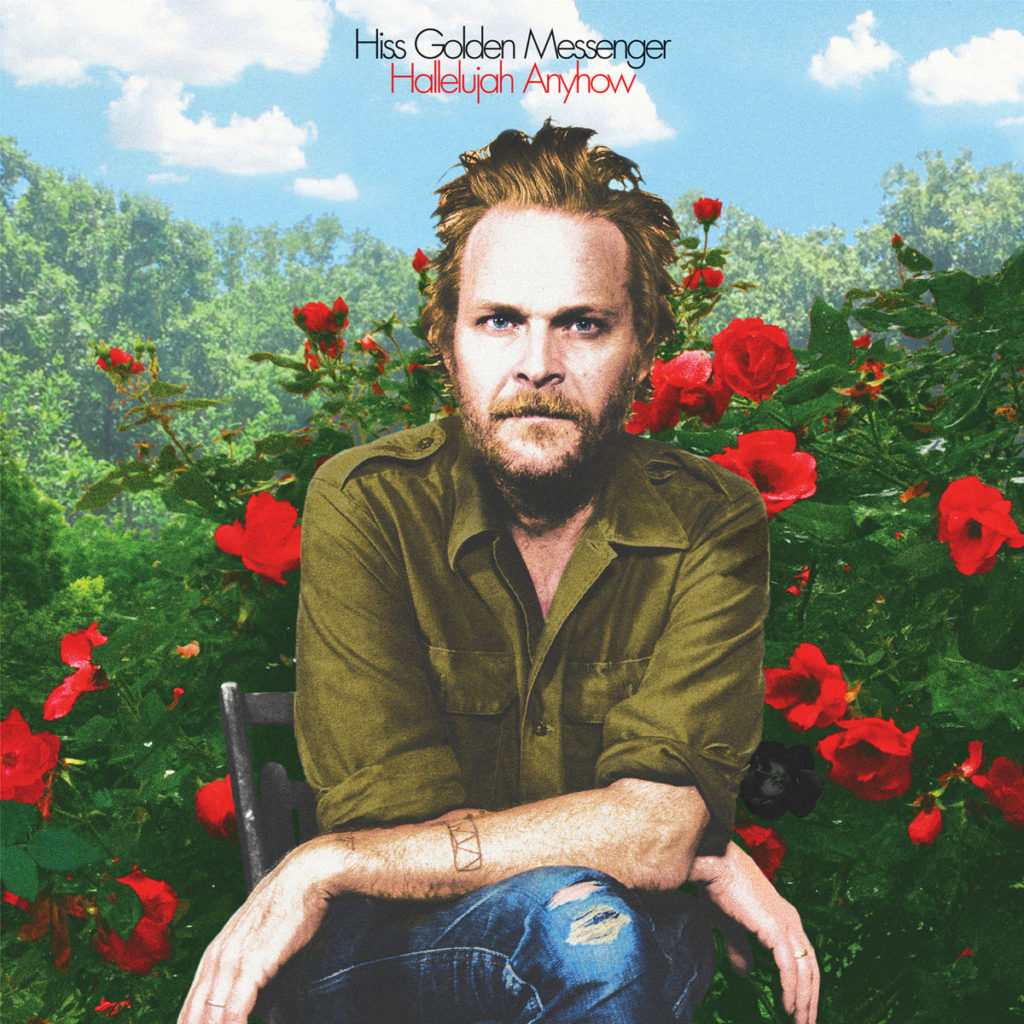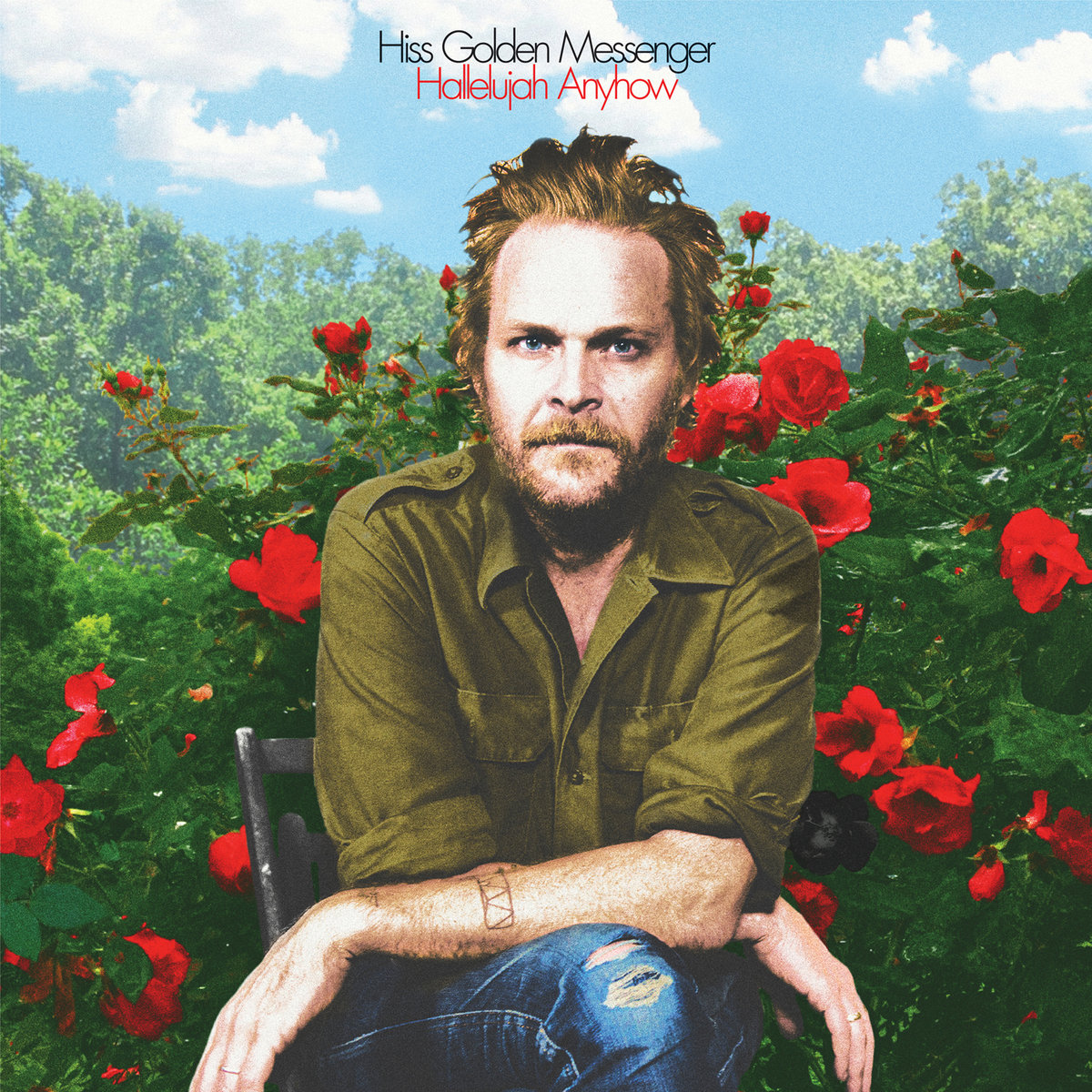
By Jim Morrison
M.C. Taylor, the songwriter and leader of Hiss Golden Messenger, moved to Chapel Hill, North Carolina to earn a graduate degree in folklore after living in San Francisco for a decade and playing in bands there.
He needed a break. So he crossed the continent to a foreign culture where he and his wife knew no one, a community he now calls “a special place.” After graduating, he took a job as a folklorist, traveling around the state, interviewing and recording musicians.
“It was perfect thing for me to witness at that time in my life when I was wondering what my relationship to music was going to be,” he says during a call from home in Durham. “I saw these people with incredibly powerful and deep connections to music that weren’t trying to put records out.”
More than a decade later, Hiss Golden Messenger’s mix of folk, soul, blues, gospel, and rock — the cornerstones of American music — have earned him an intense following and critical raves. “Taylor has produced — quietly at first, and then more loudly — one of the most impressive bodies of songwriting of the past 10 years,” says a writer for The Atlantic.
His last two albums, “Heart Like a Levee,” and “Hallelujah Anyhow,” contain some of the band’s best cuts including “Domino,” “Jenny of the Roses,” “Biloxi,” and “Heart Like a Levee,” mixing poetic lyrics and propulsive rhythms.
Taylor appears solo with Erin Rae opening at The Goode Theatre on the Old Dominion University campus on March 9 (tickets on Facebook and Eventbrite). It is a joint production of LAVA Presents and North Shore Point House Concerts, the first in a series of shows at the Goode that will include Della Mae, Suitcase Junket, Chatham County Line, and others.
VEER: When was the first album you put out that you hoped would catch on with people?
Taylor: I’ve been doing that since I was like 17. That hope dies hard. With “Bad Debt,” (2010) there was something about those compositions that felt genuine to myself. It felt like I had carved out a little corner of the universe that was mine.
At the core, the way that I compose songs and the language that I use has remained pretty close to what I found with “Bad Debt.”
V: You found your voice.
T: I think I did. I don’t know what my goal was except to create something that felt true to my experiences at that time as a young dad and a little bit lost in the world. I was very happy in a lot of ways but I was pretty lost. I think that I was just seeing whether I could write myself out of that place.
Creating songs has always been kind of a healing thing for me to do. I was doing it then with no intention of those songs going any further than the kitchen table. I have tried to stay really close to the sensations that drove that record.
V: Your work is so personal, it almost seems like you’re leading us on your journey.
T: I think that what I respond to as a listener of music — and all kinds of art — is vulnerability. It’s hard to say what exactly it is that makes it feel vulnerable. That’s the thing that draws me most powerfully to other art. I suspect that’s what draws people to my own art.
My work isn’t strictly autobiographical, but I think there is enough real feeling in the songs that comes from just living in the real world that people respond to. I think people connect to my records because they can see themselves in them. I’m a guy with two kids. I’m hoping everything works out in life for my family and myself. I think that’s the experience of a lot of people.
V: You talk about ambiguity in songs. Some of the best songs mean different things at different times and mean different things to different people.
T: I find myself not as good at establishing a concrete narrative in a song. The ambiguity is just part of my writing. It’s not really intentional. It’s more I have a specific language that I use. The imagery that appears in my songs I know exactly what I’m singing about and where I got it from. (laughs). But I never make any of that stuff specific. Who’s to say someone else’s interpretation is wrong? If you have a powerful connection to the song I don’t really care whether you’re explication is different from mine, even if I’m the one who wrote the song.
V: I’ve read you say poets are a bigger influence than other songwriters in your writing. I wonder if that all fits together.
T: I think it totally does. My models for writing have always been poets. It’s not really other songwriters. Music is the animating force in my life, but in terms of the way that my words feel and look on a page, I spend a lot more time with poetry.
When I’m listening to music, I’m listening to the words, but I’m also listening to the rhythm of the words. I could go for years and years just paying attention to the rhythm of how something is sung and when I learn what the words are, I can be totally surprised. Like, oh, wow, that’s what they were singing about? That’s crazy. I had no idea.
V: Are there poets you go to when you know you’re going to write?
T: We just lost a really important poet in my life, Mary Oliver. She was a big one. She kind of goes hand in hand with another poet whose work means a ton to me, Wendell Berry. The two of those for years and years have really provided a lot of sustenance. The language that they use and their rhythms are close to what I aspire to do.
But, man, I’m all over the place. I just picked up a couple of huge volumes of James Merrill. He had an interesting phase for a few years when he was writing poetry using a Ouija board. It’s pretty haunted. I love William Blake. I love Yeats. I love Sharon Olds. Anyone who is struggling with language, I’m going to be drawn to. I’m often more inspired by whose work has an economy to it. I’m always trying to write in a way that I can say a lot with a few words.
V: I read a New Yorker story about you in which the writer said if there’s a void, you’ve almost certainly locked eyes with it. I wondered if you felt that was true and what it looks like.
T: Yeah. I guess I probably have. More than other people? I don’t know. I have the good fortune to be able to report on it. I don’t know that my life is any more complicated than yours or anyone else’s. It’s just I have been given gift of being able to write and sing about it.
I think there are a lot of people who are staring into the void and they don’t know what to do with that information. It can hurt. It can be painful. I get to get up on stage and sing about it in a way that feels cathartic and productive.
V: I saw you were a fan of rap, not metal, as a child and I wondered if that’s filtered into your work.
T: (Laughs). I’ve never felt compelled to make rap music. I say that seriously. That would be one question if rhythm is the thing for you. The whole foundation of the American music I love so much, a lot of it is rhythmic in intention. You listen to some of those Blind Boy Fuller records. Or Mississippi John Hurt. Or Ralph Stanley. It’s all so rhythmic that while the words are important, in my own humble opinion, the revolution that was happening with that music was a rhythmic revolution.
I’m just drawn to stuff that has a pocket to it. When I’m going to put a record on there’s some part of me that is needing to hear the rhythm.
V: You are doing a run of solo gigs. I wondered why the solo shows appeal.
T: It’s fun. It’s kind of scary. It’s a little bit of a tightrope walk. I can’t really depend on anybody else to cover up my mistakes. It’s a challenge. It’s been many years since I’ve done a solo tour. It just felt like I want to try this and see if I can do it still. I think I can.
WANT TO GO?
Hiss Golden Messenger (solo)
March 9, 8 p.m.
The Goode Theatre
Monarch Way
Old Dominion University




